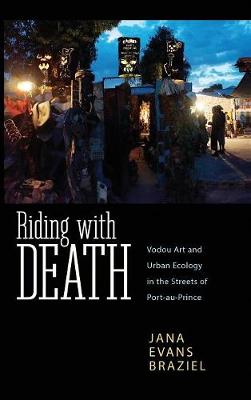Caribbean Studies
1 total work
On the southern end of the Grand Rue, a major thoroughfare that runs through the center of Port-au-Prince, waits the Haitian capital's automobile repair district. This veritable junkyard of steel and rubber, recycled parts, old tires, and scrap metal might seem an unlikely foundry for art. Yet, on the street's opposite end thrives the Grand Rue Galerie, a working studio of assembled art and sculptures wrought from the refuse.
Established by artists Andre Eugene and Celeur in the late 1990s, the Grand Rue's urban environmental aesthetics-defined by motifs of machinic urbanism, Vodou bricolage, the postprimitivist altermodern, and performative politics-radically challenge ideas about consumption, waste, and environmental hazards, as well as consider innovative solutions to these problems in the midst of poverty, insufficient social welfare, lack of access to arts, education, and basic needs.
In Riding with Death, Jana Braziel explores the urban environmental aesthetics of the Grand Rue Sculptors and the beautifully constructed sculptures they have designed from salvaged automobile parts, rubber tires, carved wood, and other recycled materials.Through first-person accounts and fieldwork, Braziel constructs an urban ecological framework for understanding these sculptures amid environmental degradation and grinding poverty. Influenced by urban geographers, art historians, and political theorists, the book regards the underdeveloped cities of the Global South as alternate spaces for challenging the profit-driven machinations of global capitalism. Above all, Braziel presents Haitian artists who live on the most challenged Caribbean island, yet who thrive as creators reinventing refuse as art and resisting the abjection of their circumstances.
Established by artists Andre Eugene and Celeur in the late 1990s, the Grand Rue's urban environmental aesthetics-defined by motifs of machinic urbanism, Vodou bricolage, the postprimitivist altermodern, and performative politics-radically challenge ideas about consumption, waste, and environmental hazards, as well as consider innovative solutions to these problems in the midst of poverty, insufficient social welfare, lack of access to arts, education, and basic needs.
In Riding with Death, Jana Braziel explores the urban environmental aesthetics of the Grand Rue Sculptors and the beautifully constructed sculptures they have designed from salvaged automobile parts, rubber tires, carved wood, and other recycled materials.Through first-person accounts and fieldwork, Braziel constructs an urban ecological framework for understanding these sculptures amid environmental degradation and grinding poverty. Influenced by urban geographers, art historians, and political theorists, the book regards the underdeveloped cities of the Global South as alternate spaces for challenging the profit-driven machinations of global capitalism. Above all, Braziel presents Haitian artists who live on the most challenged Caribbean island, yet who thrive as creators reinventing refuse as art and resisting the abjection of their circumstances.
